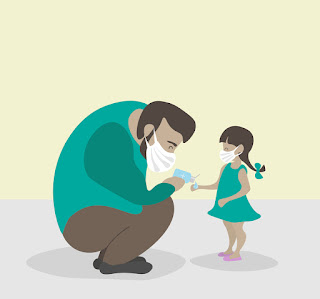Providing Support to Your Child During COVID Distress
Providing Support to Your Child During COVID Distress
This year of being subjected to COVID-19 restrictions has had an impact on all of us, including our children. They've had to stay inside (along with their stressed-out parents), cut off from friends, and their routines have been thrown off. This life-changing experience will have an impact on them for years to come. However, it does not have to be entirely negative. You can take advantage of the situation to teach them how to cope with stress.
We learn who we are and how to manage ourselves in the world during our childhood. Children are greatly influenced by how their parents treat them on a daily basis and guide them through challenging times. — Even adolescents absorb messages from their parents (despite their frequent self-absorption and focus on peers). Your children will carry these lessons with them into adulthood, even if you don't realise it.
You can help your children grow from their current pandemic experiences by emphasising the following four key messages:
• You are not the issue.
During this time, your child may feel stressed, afraid, and out of sorts. These emotions can be upsetting, and your child may wonder what is wrong with them. They will learn that they are OK if their feelings are validated and they are told that their reactions are understandable.
• This period of stress and anxiety will pass.
Despite how it may appear, this pandemic will not last indefinitely. Restrictions will be lifted eventually, they will return to school and see their friends in person, and life will go on. Allowing your child to know this (and reminding yourself of it) can help to alleviate their fears.
• There are steps you can take to assist yourself.
Encourage your child to find ways to have fun at home. They might enjoy arts and crafts, learning new things, or reading. They may not be able to meet in person with their friends, but they can spend time together virtually. And if they are feeling anxious or sad, they can do the same things to help them get through it.
• You are not by yourself.
Let them know that everyone requires assistance from time to time. With this in mind, encourage them to seek help from you or another responsible adult they can rely on.
Adults who are the healthiest and happiest tend to have a positive self-image, believe they can overcome obstacles, and see important people in their lives as emotionally available to them. By teaching your children to see themselves and others in these ways, you will be preparing them to thrive throughout their lives, even when faced with inevitable challenges.
If you have any questions or concerns about this video, please write them down beforehand.
If you enjoyed the video, please give it a thumbs up and share it with your friends.
Subscribe to the channel to get notified about the new upcoming videos !

Comments
Post a Comment